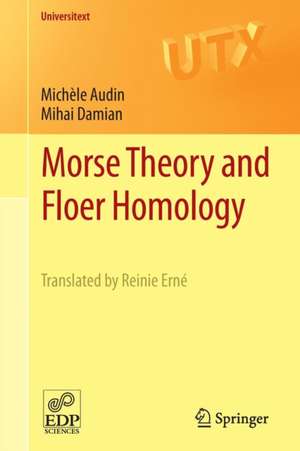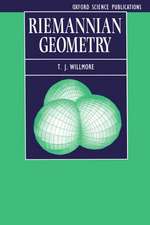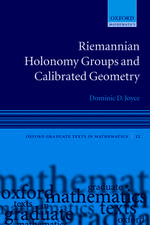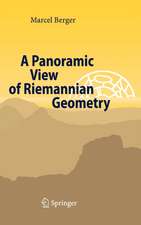Morse Theory and Floer Homology: Universitext
Autor Michèle Audin, Mihai Damian Traducere de Reinie Ernéen Limba Engleză Paperback – 17 dec 2013
The first part is a thorough introduction to Morse theory, a fundamental tool of differential topology. It defines the Morse complex and the Morse homology, and develops some of their applications.
Morse homology also serves a simple model for Floer homology, which is covered in the second part. Floer homology is an infinite-dimensional analogue of Morse homology. Its involvement has been crucial in the recent achievements in symplectic geometry and in particular in the proof of the Arnold conjecture. The building blocks of Floer homology are more intricate and imply the use of more sophisticated analytical methods, all of which are explained in this second part.
The three appendices present a few prerequisites in differential geometry, algebraic topology and analysis.
The book originated in a graduate course given at Strasbourg University, and contains a large range of figures and exercises. Morse Theory and Floer Homology will be particularly helpful for graduate and postgraduate students.
Din seria Universitext
- 13%
 Preț: 353.49 lei
Preț: 353.49 lei -
 Preț: 487.96 lei
Preț: 487.96 lei - 15%
 Preț: 543.75 lei
Preț: 543.75 lei -
 Preț: 418.67 lei
Preț: 418.67 lei - 20%
 Preț: 628.22 lei
Preț: 628.22 lei -
 Preț: 322.62 lei
Preț: 322.62 lei - 17%
 Preț: 364.82 lei
Preț: 364.82 lei -
 Preț: 634.38 lei
Preț: 634.38 lei - 17%
 Preț: 427.32 lei
Preț: 427.32 lei - 13%
 Preț: 355.52 lei
Preț: 355.52 lei - 17%
 Preț: 431.50 lei
Preț: 431.50 lei - 19%
 Preț: 429.21 lei
Preț: 429.21 lei - 19%
 Preț: 393.95 lei
Preț: 393.95 lei -
 Preț: 360.08 lei
Preț: 360.08 lei -
 Preț: 358.44 lei
Preț: 358.44 lei - 13%
 Preț: 389.95 lei
Preț: 389.95 lei -
 Preț: 465.61 lei
Preț: 465.61 lei -
 Preț: 371.99 lei
Preț: 371.99 lei - 15%
 Preț: 497.22 lei
Preț: 497.22 lei - 15%
 Preț: 737.46 lei
Preț: 737.46 lei - 17%
 Preț: 394.41 lei
Preț: 394.41 lei - 15%
 Preț: 509.58 lei
Preț: 509.58 lei - 17%
 Preț: 427.68 lei
Preț: 427.68 lei - 8%
 Preț: 495.44 lei
Preț: 495.44 lei - 17%
 Preț: 364.57 lei
Preț: 364.57 lei - 17%
 Preț: 369.08 lei
Preț: 369.08 lei -
 Preț: 396.55 lei
Preț: 396.55 lei - 15%
 Preț: 553.33 lei
Preț: 553.33 lei - 17%
 Preț: 365.35 lei
Preț: 365.35 lei -
 Preț: 356.78 lei
Preț: 356.78 lei -
 Preț: 673.45 lei
Preț: 673.45 lei - 17%
 Preț: 426.76 lei
Preț: 426.76 lei - 20%
 Preț: 569.56 lei
Preț: 569.56 lei -
 Preț: 372.87 lei
Preț: 372.87 lei -
 Preț: 319.07 lei
Preț: 319.07 lei -
 Preț: 379.86 lei
Preț: 379.86 lei -
 Preț: 445.88 lei
Preț: 445.88 lei -
 Preț: 382.36 lei
Preț: 382.36 lei - 15%
 Preț: 533.72 lei
Preț: 533.72 lei - 15%
 Preț: 496.02 lei
Preț: 496.02 lei - 15%
 Preț: 474.82 lei
Preț: 474.82 lei -
 Preț: 389.70 lei
Preț: 389.70 lei -
 Preț: 484.08 lei
Preț: 484.08 lei - 15%
 Preț: 643.48 lei
Preț: 643.48 lei -
 Preț: 415.02 lei
Preț: 415.02 lei - 15%
 Preț: 602.25 lei
Preț: 602.25 lei - 20%
 Preț: 510.24 lei
Preț: 510.24 lei - 15%
 Preț: 588.37 lei
Preț: 588.37 lei -
 Preț: 381.59 lei
Preț: 381.59 lei
Preț: 599.32 lei
Preț vechi: 705.09 lei
-15% Nou
Puncte Express: 899
Preț estimativ în valută:
114.72€ • 124.65$ • 96.42£
114.72€ • 124.65$ • 96.42£
Carte tipărită la comandă
Livrare economică 21 aprilie-05 mai
Preluare comenzi: 021 569.72.76
Specificații
ISBN-13: 9781447154952
ISBN-10: 1447154959
Pagini: 628
Ilustrații: XIV, 596 p. 114 illus.
Dimensiuni: 155 x 235 x 33 mm
Greutate: 0.84 kg
Ediția:2014
Editura: SPRINGER LONDON
Colecția Springer
Seria Universitext
Locul publicării:London, United Kingdom
ISBN-10: 1447154959
Pagini: 628
Ilustrații: XIV, 596 p. 114 illus.
Dimensiuni: 155 x 235 x 33 mm
Greutate: 0.84 kg
Ediția:2014
Editura: SPRINGER LONDON
Colecția Springer
Seria Universitext
Locul publicării:London, United Kingdom
Public țintă
GraduateCuprins
Introduction to Part I.- Morse Functions.- Pseudo-Gradients.- The Morse Complex.- Morse Homology, Applications.- Introduction to Part II.- What You Need To Know About Symplectic Geometry.- The Arnold Conjecture and the Floer Equation.- The Maslov Index.- Linearization and Transversality.- Spaces of Trajectories.- From Floer To Morse.- Floer Homology: Invariance.- Elliptic Regularity.- Technical Lemmas.- Exercises for the Second Part.- Appendices: What You Need to Know to Read This Book.
Recenzii
From the book reviews:
“The present book is an excellent, detailed and self-contained introduction to Morse theory and Floer homology which makes both topics easily accessible to graduate or even advanced undergraduate students.” (Sonja Hohloch, Mathematical Reviews, August, 2014)
“Morse Theory and Floer Homology is a relatively high-level introduction to, and in fact a full account of, the extremely elegant and properly celebrated solution to the Arnol’d problem by the prodigious and tragic Andreas Floer … . the book is exceptionally well written. Indeed, this is a very good book on a beautiful and important subject and will richly repay those who take the time to work through it.” (Michael Berg, MAA Reviews, February, 2014)
“The present book is an excellent, detailed and self-contained introduction to Morse theory and Floer homology which makes both topics easily accessible to graduate or even advanced undergraduate students.” (Sonja Hohloch, Mathematical Reviews, August, 2014)
“Morse Theory and Floer Homology is a relatively high-level introduction to, and in fact a full account of, the extremely elegant and properly celebrated solution to the Arnol’d problem by the prodigious and tragic Andreas Floer … . the book is exceptionally well written. Indeed, this is a very good book on a beautiful and important subject and will richly repay those who take the time to work through it.” (Michael Berg, MAA Reviews, February, 2014)
Textul de pe ultima copertă
This book is an introduction to modern methods of symplectic topology. It is devoted to explaining the solution of an important problem originating from classical mechanics: the 'Arnold conjecture', which asserts that the number of 1-periodic trajectories of a non-degenerate Hamiltonian system is bounded below by the dimension of the homology of the underlying manifold.
The first part is a thorough introduction to Morse theory, a fundamental tool of differential topology. It defines the Morse complex and the Morse homology, and develops some of their applications.
Morse homology also serves a simple model for Floer homology, which is covered in the second part. Floer homology is an infinite-dimensional analogue of Morse homology. Its involvement has been crucial in the recent achievements in symplectic geometry and in particular in the proof of the Arnold conjecture. The building blocks of Floer homology are more intricate and imply the use of more sophisticated analytical methods, all of which are explained in this second part.
The three appendices present a few prerequisites in differential geometry, algebraic topology and analysis.
The book originated in a graduate course given at Strasbourg University, and contains a large range of figures and exercises. Morse Theory and Floer Homology will be particularly helpful for graduate and postgraduate students.
The first part is a thorough introduction to Morse theory, a fundamental tool of differential topology. It defines the Morse complex and the Morse homology, and develops some of their applications.
Morse homology also serves a simple model for Floer homology, which is covered in the second part. Floer homology is an infinite-dimensional analogue of Morse homology. Its involvement has been crucial in the recent achievements in symplectic geometry and in particular in the proof of the Arnold conjecture. The building blocks of Floer homology are more intricate and imply the use of more sophisticated analytical methods, all of which are explained in this second part.
The three appendices present a few prerequisites in differential geometry, algebraic topology and analysis.
The book originated in a graduate course given at Strasbourg University, and contains a large range of figures and exercises. Morse Theory and Floer Homology will be particularly helpful for graduate and postgraduate students.
Caracteristici
Translation of the popular French textbook Provides a unified presentation of Morse theory and Floer homology that is unique in the English language Explains all the required background on symplectic geometry, differential geometry, algebraic topology and analysis Includes supplementary material: sn.pub/extras

















